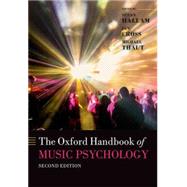The second edition of The Oxford Handbook of Music Psychology updates the original landmark text and provides a comprehensive review of the latest developments in this fast-growing area of research. Covering both experimental and theoretical perspectives, each of the 11 sections is edited by an internationally recognised authority in the area.
The first ten parts present chapters that focus on specific areas of music psychology: the origins and functions of music; music perception, responses to music; music and the brain; musical development; learning musical skills; musical performance; composition and improvisation; the role of music in everyday life; and music therapy. In each part authors critically review the literature, highlight current issues and explore possibilities for the future.
The final part examines how, in recent years, the study of music psychology has broadened to include a range of other disciplines. It considers the way that research has developed in relation to technological advances, and points the direction for further development in the field. With contributions from internationally recognised experts across 55 chapters, it is an essential resource for students and researchers in psychology and musicology.








